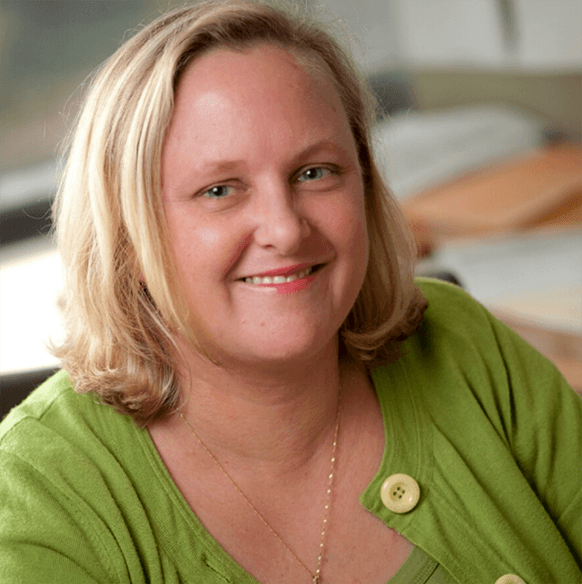The Ken Kennedy Institute's February Member of the Month, Dr. K. Jane Grande-Allen's research applies engineering analysis to understand and fight heart valve disease. This involves mechanical testing, biochemical measurements, and microstructural analysis of critical components found in the extracellular matrix (ECM) that makes up cardiac tissue. Her studies into the basic and applied physiology of heart valve tissue have shown that the ECM – collagen, elastin, glycosaminoglycans and proteoglycans – forms an intricate network of connective tissue that is influenced by valvular function, growth, and abnormalities.
Her investigations of the chemical and mechanical conditions in both diseased and healthy valves are designed to reveal why structural defects occur and how to develop alternatives to conventional open-heart surgery to repair/replace diseased heart valves. These alternatives include drug therapies and engineered heart valves for patients of different age groups.
In recognition of her work in research, she has received the Oak Ridge Associated Universities Ralph E. Powe Junior Faculty Development Award (2005), Hamill Innovation (2005, 2008, 2010) and Medical Innovation (2007, 2011) awards from Rice’s Institute for Biosciences and Bioengineering (IBB), the Outstanding Young Scientist Award from the Houston Society for Engineering in Medicine and Biology (2005), the A.J. Durelli Award from the Society for Experimental Mechanics, Inc. (2011), the Editorial Excellence Award by the Annals of Biomedical Engineering (2011), and the Established Investigator Award from the American Heart Association (2012).
Grande-Allen has also been widely recognized at Rice for her efforts in teaching and mentoring. She is a recipient of the Brown Foundation Teaching Award (2006), the Presidential Mentoring Award (2009), the Excellence in Advising Award from the Office of Academic Advising (2010), the Faculty Teaching and Mentoring Award from the Graduate Student Association (2014), the George R. Brown Award for Superior Teaching (2014) by the Association of Rice Alumni, and the Teaching and Research Excellence Award (2016) from the George R. Brown School of Engineering.
Grande-Allen is a fellow of the American Institute for Medical and Biological Engineering (2011), a fellow of the Biomedical Engineering Society (2013), a fellow of American Heart Association's Council on Arteriosclerosis, Thrombosis and Vascular Biology (2014), a fellow of the Society for Experimental Mechanics (2015), and a fellow of the American Association for the Advancement of Science (2015). She is a member of the executive board of the Society for Experimental Mechanics (2010-Present). She served two terms on the Biomedical Engineering Society's board of directors (2009-2015) and is a deputy editor-in-chief for the society's journal Annals of Biomedical Engineering. Additional roles include associate editor/editorial board member for the journals Cardiovascular Engineering and Technology, Tissue Engineering, BCM Biotechnology, and Experimental Techniques. On the Rice campus, she was a member of the executive committee of the faculty senate (2010-2013), a member of the advisory board for the Center for Teaching Excellence (2012-2014), a faculty advisor to the president (2014-2016), and director of the Institute of Biosciences and Bioengineering (2016-2017).
What is your favorite book?
I read a lot of science fiction - my long-time favorite book is Dune by Frank Herbert. I read of lot of serial novels and loosely related novels by the same author, in SF as well as other genres. Right now I am on a kick of reading novels involving time travel/alternate lives/repeated lives.
How do you explain your research in one sentence?
We develop tools to investigate how cells and tissues are influenced by their mechanical environment.
What is your favorite aspect of your research?
I get really excited when unexpected findings turn into new questions. That’s not always the easiest pathway to figure out, but it’s always more interesting. Another favorite aspect has been when my students come up with entirely new research ideas on their own. Some of our most fun and impactful projects have developed this way.
What challenges do you see in your research that you didn't expect?
When I was getting started in my academic career, I was very naïve about the need for mentor training. There is need for mentoring at so many levels in our research at Rice. Undergraduates are having their first research experiences. Our graduate students need mentoring as they learn to balance investigating a topic deeply with taking on adult responsibilities. Faculty need mentoring as well – but few of us get training in how to do this properly. I’m grateful for the mentoring engagements that I’ve experienced at Rice, and yet I believe that this remains a challenge for us.
How do you see computation and data advancing in the future?
I would like to see empowerment of a broader swath of trainees – of all ages - who are skilled in computational and data analysis skills. I would particularly like to see this training and application in the medical field. Our faculty at Rice have exciting collaborations with biomedical faculty at the Texas Medical Center and other hospital systems; I’d be excited to see us engaged in developing hybrid coursework that teaches research-minded medical students how to formulate computational data science questions and identify or develop tools to answer those questions.
What is your favorite experience with the Ken Kennedy Institute?
The lunchtime presentations were always my favorite event, especially with the opportunities to catch up with colleagues from across campus. I’ve missed these!

